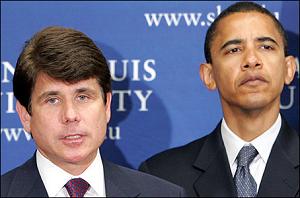Top 10 Logical Fallacies in Politics - Page 2
The human brain is wired all wrong. Those not versed in logic are blissfully unaware of how much our brain messes up the most basic of arguments, leading to the mess of random thoughts, non-sequiturs, cognitive dissonance, white lies, misinformation, and syntax errors that we call consciousness. Luckily, there is one place where all of these logical misteps can be exemplified: politics. What follows is a crash course in some of the most prevelant fallacies we all make, as they appear in modern American politics. And though I consider these the "top 10" logical fallacies in politics, they are not in order, for reasons that should become clear rather quickly.
THE FALLACY OF THE SINGLE CAUSE
 | | Now whenever anybody complains about anything, you can just point to your shirt |
Let's face it: life is complex. When bad things happen, it would be really easy to point to a single cause for it, be it the devil, violent video games, consumerism, or Rush Limbaugh. The fallacy of the single cause is an intellectual shortcut that everyday people use all the time and that politicians use to make talking points.
President Obama blames modern media for what he considers to be misinformation about healthcare. If it weren't for Fox News, talk radio, and bloggers, he implies, everyone would be embracing his healthcare initiative with open arms. On the other side of the aisle, I'm sure there are several people who believe that, if it weren't for those very same things, Obama wouldn't have gotten elected. These kinds of arguments fail to take into consideration a whole spectrum of things that contribute to current events. While modern media might share some blame for how things have turned out, they are likely only responsible for a tiny percentage of it. Besides, any such argument is an ignoratio elenchi, in that whomever is to blame is beside the point.
Other common culprits cited as the single cause for our political woes are things like "special interests," the two-party system, poor education, public school indoctrination, rich people, reality television, and the prevelance of logical fallacies in political argument.
THE APPEAL TO MOTIVE/ASSOCIATION FALLACY
 | | Not even their mothers can tell them apart! |
The appeal to motive happens whenever you are asked to consider why a person holds a position. For example, a guy tells a girl at a bar that he believes the world would be a better place if people were more charitable. The only reason he makes this statement is because he wants a blowjob, but that doesn't mean his statement is incorrect. Perhaps the world really would be a better place if people were more charitable, meaning of course that it would be a better place if more people gave blowjobs.
People are surprisingly up-front with this logical fallacy, especially in politics. They come right out and ask, "Yeah, but why does he hold that position?" There are plenty of people willing to imply that many politicians are involved in plans to thwart the American system or gain absolute power or enact Big Brother or whatever, because if we can question a politician's motives, we don't have to pay attention to what they are actually saying.
A corollary to this is the association fallacy, better known as guilt by association. The Republicans are big on this, as when they recently tried to make Barack Obama out to be an extremist because he is associated with Jeremiah Wright and Bill Ayers. If a person knows somebody with extreme views, the implication goes, then that person must be an extremist as well. This is obviously fallacious, and yet people fall for it all the time. Both sides often do it when it comes to protests, when they start talking about who funds them or "is behind" them, because it is far easier to talk about that than it is to actually confront the issue being protested.
ARGUMENTUM AD POPULUM
 | | Poor, confused lemmings |
The argumentum ad populum is a fairly specific logical fallacy that assumes that if a majority of people hold a certain belief, that belief must be true. This may seem laughable at first glance, but it's an argument that is constantly being implied by news media of all types. Whenever a reporter, anchorman, or writer starts discussing poll numbers, the common implication is that whatever most people believe must be the truth. Granted, this isn't always the case; sometimes poll numbers will be discussed in terms of who is likely to be elected.
However, we have had political leaders who treat polling statistics as gospel, leaders who change their positions on the basis of poll numbers alone. You could argue that they do this because they want to get re-elected, but then people get mad whenever a politician goes against the majority opinion of his or her constituents, as we recently saw with the healthcare initiative. Just because a majority of people believe something to be wrong, it doesn't mean that it is.
This is a representative democracy, not a true democracy, which means that we elect our leaders to make the difficult choices. The most popular course isn't always the right course, and thus going against the majority view may sometimes be the right thing to do.
ARGUMENTUM AD METUM
 | | You aren't a communist, are you? |
Whenever a politician appeals to your fears, insecurities, or paranoia, he or she is demonstrating the logical fallacy of the argumentum ad metum. This one is a combination of a bunch of the above fallacies, as it can be an irrelevant thesis, an unfalsifiable hypothesis, an appeal to motive, and a slippery slope straw man argument, as in the example, "If we don't do X, the terrorists win."
This is a common tactic throughout politics. Republicans want you to be afraid of socialism, terrorism, and a world on the verge of World War III. Democrats want you to be afraid of a global warming apocalypse, racism run amok, and Republicans. While all of these fears can in one way or another be justified, there shouldn't be any need to appeal to them when making an argument. President Bush didn't have to invoke the image of a mushroom cloud on American soil to explain the invasion of Iraq, and President Obama didn't have to invoke the image of poor mothers dying of starvation in the streets to sell his healthcare initiative.
It's a particularly sleezy way to make a point, and it is fallacious in multiple ways. Still, it is dramatic and effective, and thus all politicians and pundits use the argumentum ad metum on a regular basis. It works because it is an "us vs. them" form of argument, and it bypasses a certain degree of critical thinking by playing to people's emotions. Whenever you allow an argument like this to work on you, you bring the country one step closer to a bloody civil war.
ARGUMENTUM AD NAUSEAM
 | | Sometimes, it feels like there's no way out |
Do you ever get the feeling you've heard the same argument a hundred times before? Does it amaze you that most politicians will make the same points again and again, even if those points have been roundly rebuked and discredited? This doesn't faze a politician or pundit, because they live by the argumentum ad nauseam, the rhetorical school of thought whereby if something is repeated often enough, people will come to believe it.
President Obama is the king of this. No matter how many nearly identical speeches he makes all over the country, he still feels like he's not getting his message across. Even after the "bipartisan" healthcare summit, he continued to misrepresent the Republican side of the argument and make points that had been fully and completely annihilated by the opposition. Of course, the Republicans were behaving in much the same way.
Make no mistakes, though, the current president is hardly the first person to do this. The very existence of talking points and campaign slogans is evidence that the argumentum ad nauseam has been with us for far longer than any of us have been alive. It is perhaps more annoying today than it has ever been, because people who follow politics now have access to the Internet, where they can find nearly every side to every political argument. When these arguments develop at a snail's pace--if at all--you get the feeling that politics never really change.
And that, unfortunately, is mostly true.
[But wait, there's more! CLICK HERE and then CLICK HERE for even more logical fallacies in politics!]
-e. magill 4/7/2010
|
|